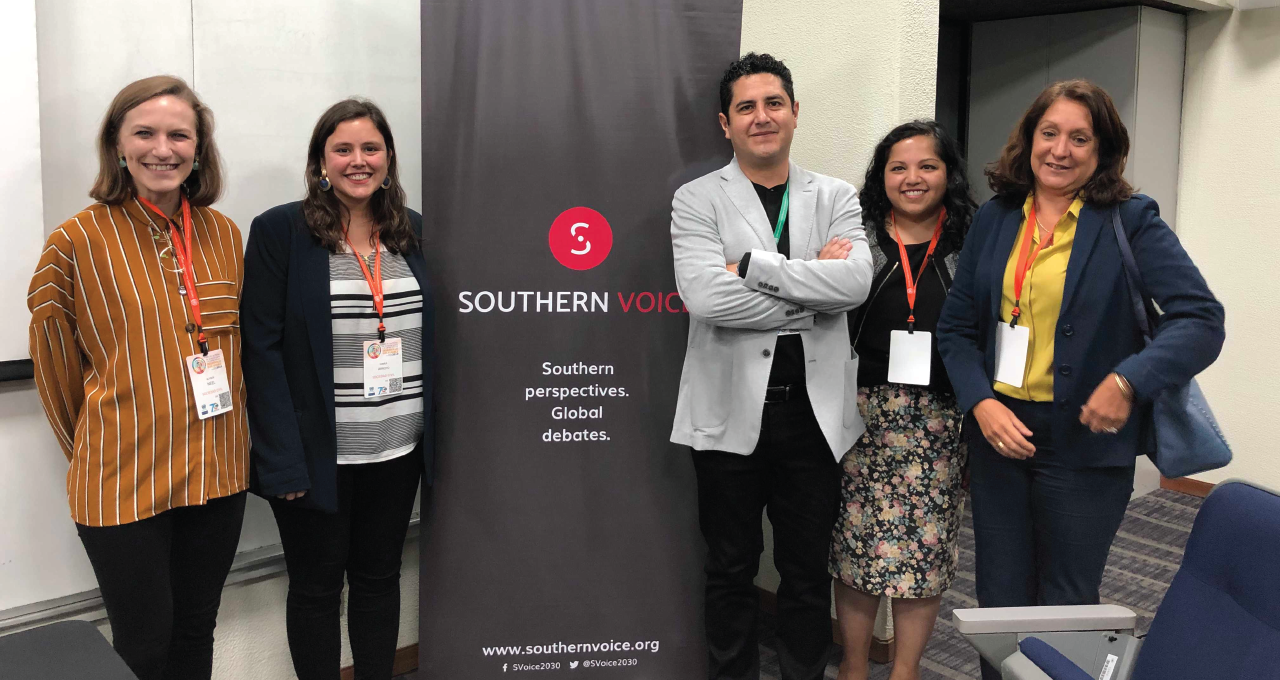Even though educational coverage and investment in education have significantly increased in Latin America, quality has not progressed at the same rate. About 40% of the students in the region are not able to perform basic mathematical operations, and almost half of them is unable to identify the main idea in a text.
This prompted Southern Voice, the United Nations Foundation and Espacio Público to co-host a panel on the connections between decent employment (SDG 8) and quality education (SDG 4) and its implications in Latin America. The findings presented by Werner Hernani-Limarino – Fundación ARU (Bolivia) and Lorena Alcázar – GRADE (Peru) are part of Southern Voice’s “State of the SDGs” initiative. Camila Arroyo from Espacio Público (Chile) joined the panel. What follows are the speaker’s main discussion points.
Schooling does not equal learning
All panellists highlighted the synergies – and gaps – that exist within the transitions from the education system to the labour market in the region. They talked about the critical aspects that need to be tackled.
“It’s a mistake to equate access to education with quality of education”, said Mr Hernani-Limari at the panel. Research conducted in Bolivia by ARU Foundation shows that the economic returns to schooling are minimal. In fact, schooling gains are no longer associated with poverty and inequality reductions. ARU’s research also indicates that networks strongly impact access to employment and other dealings. Social capital is not available for everyone and can deepen inequalities.
Education or employment?
A study conducted by the IDB and Espacio Publico about millennials in Latin America shows that 21% of young people do not study or work. This group is often referred to as NEETs (not in education, employment, or training). However, only 3% of those identified as NEETs are ‘inactive’. In Chile, for example, young people who are not working or studying, are often engaged in other activities. They have care responsibilities, are looking for a job, or have a disability. Contrary to the common belief, young people in the NEET group are as responsible, emotionally stable, and self-assured as those who study or work. NEET youth also tends to be more risk-tolerant. They are less impatient than young people who work or study. “There is a need to debunk stereotypes around young people’s use of time. This would help develop effective education and employment policies in the region”, said Ms Arroyo.
In many Latin American countries, the NEET group is mostly formed by young women. While there is a gender balance within the group of those who only work or study, the proportion of women who are NEETs doubles -or in some cases even triples- the number of men in the same situation. Regional statistics show that women who are not working (outside the household) or studying, usually have children or are involved in care responsibilities.
Transitions into the labour market still precarious
The conditions under which the younger generation enters the labour market has an impact on their future economic outcomes and long-term well-being. Young people in the region start working at 16 years old and experience high levels of instability and uncertainty. In Peru, the informality rate is one of the highest worldwide: 4 out of 5 young people work informally. The situation is similar in other countries. High labour turnover, inadequate training, and the absence of social security mechanisms result in precarious employment conditions and low productivity.
Inequality trumps education
Governments need to design effective policies and strategies to tackle the problem. But they need to identify those being excluded from quality education and decent employment first. Research conducted in Peru by GRADE shows that the nature of exclusion in this country and the region is multidimensional. It is exacerbated by inequality. According to Ms Alcazar, “Today, Peruvian children excluded from quality education are up to 14% more likely to work under precarious conditions as young adults. It’s a massive disadvantage.” There is a correlation between the impact of belonging to an excluded group and job precariousness. In the case of Peru, being female or indigenous increases the risk of being left behind by 19%.
Quality education is vital
All panellists agreed that there is a clear need to improve the quality of education in Latin America. The connections between education and employment are more important than ever and need further study. This event provided the attendees with up-to-date evidence of the conditions that drive or hinder quality education and positive labour outcomes in the region. A more detailed report on these issues, plus recommendations on how to change the situation, will be presented on 12 July in New York, during the High-Level Policy Forum (HLPF) 2019.
The event took place within the framework of the 3rd meeting of the Forum of the Countries of Latin America and the Caribbean on Sustainable Development in Santiago-Chile on 22 April 2019.


